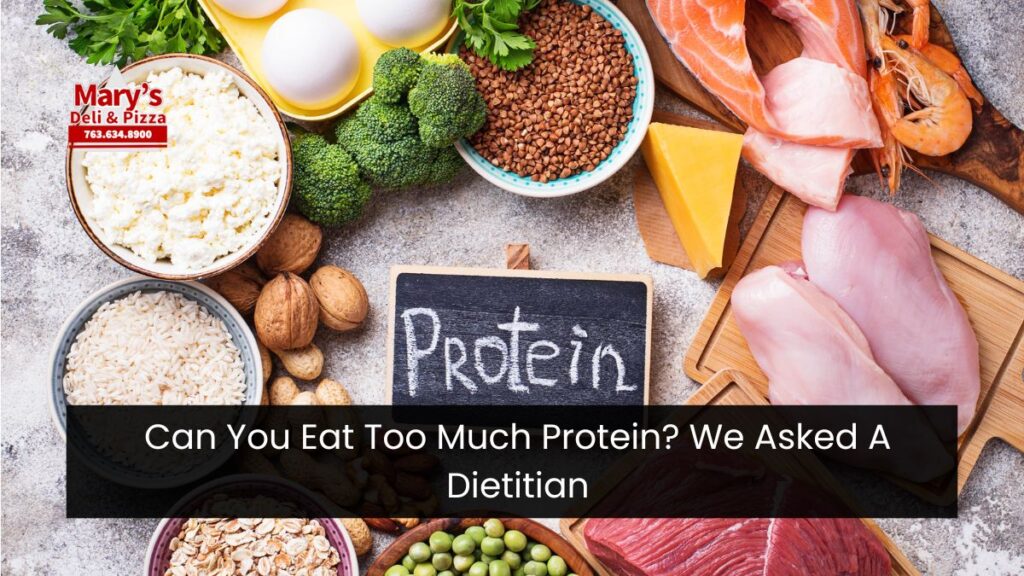In recent years, high-protein diets have gained significant popularity due to their association with benefits such as weight loss, muscle growth, and improved overall health. However, like most things in life, too much of a good thing can be harmful.
When it comes to protein, overconsumption can lead to various health issues, even though it’s an essential macronutrient.
So, is it possible to eat too much protein? The answer is yes. Consuming more protein than your body needs can result in several side effects, including digestive issues, kidney strain, and weight gain, among others.
In this article, we’ll take a closer look at the role of protein in your diet, how much you need, and the risks associated with overconsumption.
Understanding Protein: The Building Block of Life
Protein is one of the three essential macronutrients, alongside fats and carbohydrates, that the body requires in large amounts for energy, growth, and repair.
When consumed, protein is broken down into amino acids, which are used to build muscles, support the immune system, produce enzymes and hormones, and maintain cellular health.

Sources of protein come from both plant-based and animal-based foods. Common examples include meat, fish, dairy, beans, legumes, and nuts.
However, the amount of protein a person needs daily depends on various factors like age, activity level, health status, and specific life stages such as pregnancy.
How Much Protein Do You Need?
The Recommended Dietary Allowance (RDA) for protein is based on body weight and is set at 0.8 grams per kilogram (or 0.36 grams per pound) of body weight. For example, a person weighing 150 pounds would need approximately 54 grams of protein daily.
This recommendation represents the minimum amount required for most healthy, non-active adults to maintain basic bodily functions.
However, some individuals may require more protein, such as:
- Pregnant women: To support the growing baby and changes in the mother’s body.
- Athletes and physically active individuals: To repair and build muscle tissue.
- Older adults: To prevent muscle loss and promote healthy aging.
- People recovering from illness or injury: To aid in the healing process.
Research suggests that optimal protein intake for active individuals or older adults might be higher, ranging from 1.2 to 1.6 grams per kilogram of body weight. This ensures that the body gets enough protein to maintain muscle mass and overall health.
Can You Eat Too Much Protein?
While protein is vital, there is such a thing as too much. Most experts recommend keeping protein intake below 2 grams per kilogram (or 0.9 grams per pound) of body weight. Consuming protein consistently above this level can lead to several health risks.
Potential Risks of Eating Too Much Protein
1. Digestive Issues

Eating too much protein, particularly from red meat and other animal sources, can lead to digestive problems such as constipation.
This happens because high-protein diets can often be low in fiber, an essential nutrient for maintaining digestive health and regular bowel movements. Red meat, in particular, is high in fat and can slow down the digestive process, causing bloating, discomfort, and constipation.
2. Kidney Strain

Excessive protein intake can strain the kidneys, as they work to filter out the byproducts of protein metabolism. This is especially concerning for individuals with pre-existing kidney conditions.
While healthy kidneys can handle increased protein consumption, over time, too much protein may contribute to a decline in kidney function or exacerbate existing issues. Therefore, those with compromised kidney health should be cautious about how much protein they consume.
3. Heart Health Concerns
Some studies suggest that diets high in certain types of protein, particularly red and processed meats, are associated with an increased risk of cardiovascular diseases. A 2022 study found that gut microbes produce certain chemicals when red meat is consumed, which can contribute to heart disease.
Therefore, it’s essential to balance protein intake with heart-healthy food choices, like lean meats, fish, and plant-based proteins.
4. Weight Gain

While protein is a critical part of a balanced diet, consuming more than the body needs can lead to weight gain. Just like carbohydrates and fats, excess protein that is not used for energy or muscle repair gets stored as fat.
This is especially important for individuals trying to manage their weight, as excess calories, even from protein, can lead to an increase in body fat over time.
Balancing Your Protein Intake
Finding the right balance in your protein intake is key to supporting your health without overburdening your body. Below are some tips to ensure you’re consuming the right amount of protein for your lifestyle and health needs:
1. Prioritize Protein at Each Meal

Ensure you are getting a good source of protein at every meal. High-quality protein sources include lean meats like chicken or turkey, fish, eggs, dairy, tofu, legumes, and nuts. This approach ensures that you’re meeting your protein needs without overloading your system at any one time.
2. Distribute Protein Evenly Throughout the Day
It’s better to spread out your protein intake over multiple meals rather than consuming most of it in one sitting. Research shows that evenly distributing protein throughout the day can increase muscle protein synthesis by 25%, which is important for muscle health and overall energy levels.
3. Choose High-Quality Proteins
Not all proteins are created equal. Focus on nutrient-dense, whole-food protein sources that provide other essential nutrients. Examples include lean meats, plant-based proteins like beans and lentils, and dairy products.

While processed protein powders can be convenient, aim to get most of your protein from natural, whole foods whenever possible.
4. Incorporate Protein-Rich Snacks

To keep your energy levels steady and avoid overeating at meal times, consider incorporating protein-rich snacks such as Greek yogurt, hard-boiled eggs, or a handful of nuts. This can help balance your protein intake and prevent mid-afternoon energy crashes.
5. Use Supplements Sparingly
While whole food sources are ideal, protein powders and bars can be a helpful addition if you have a busy schedule or increased protein needs due to athletic activity. Just be mindful of added sugars or unhealthy ingredients, and avoid relying too heavily on supplements.
Conclusion:
Protein is essential for maintaining muscle, supporting immune function, and regulating important processes in the body. However, like anything, moderation is key. Consuming more protein than your body needs can lead to health issues, including kidney strain, digestive problems, and weight gain.
It’s important to focus on high-quality, nutrient-dense protein sources and to distribute protein intake evenly throughout the day. By doing so, you can ensure that you meet your protein needs without risking your health.






